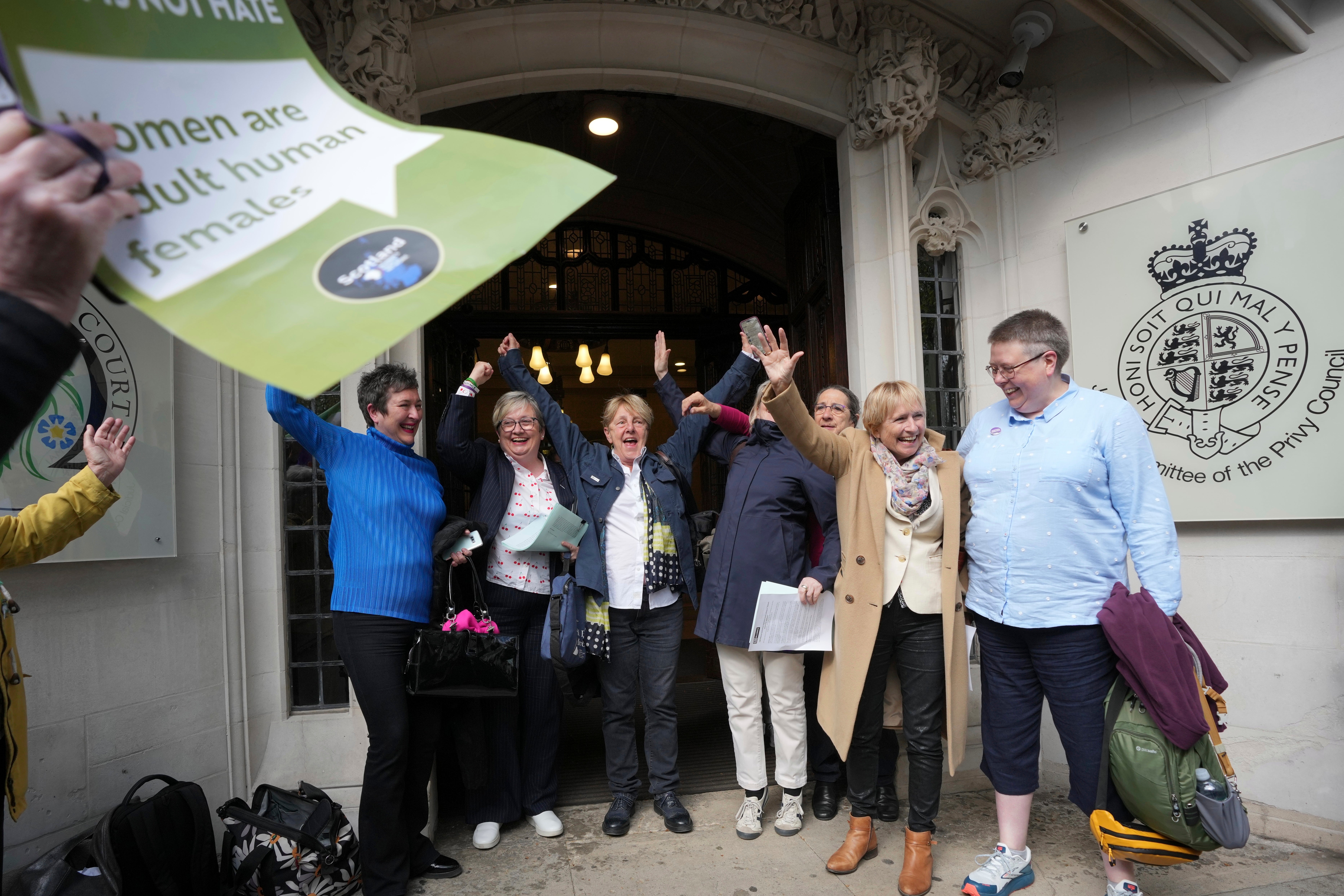ARTICLE AD BOX
Trans women are not legally women under the Equality Act, the Supreme Court has ruled in a landmark judgment.
Campaign group For Women Scotland (FWS) brought a series of challenges – including to the UK’s highest court – over the definition of “woman” in Scottish legislation mandating 50 per cent female representation on public boards.
On Wednesday, five judges from the UK Supreme Court ruled unanimously that the terms "woman" and "sex" in the Equality Act refer to a biological woman and biological sex, in a decision that could have wide-ranging ramifications for trans women’s rights to use services and spaces reserved for women.
Gender critical rights campaigners have hailed the ruling as a victory for biological women that will protect single-sex spaces, with FWS saying they were “absolutely jubilant” about the result.
But trans rights groups have reacted with dismay, warning that it will “exclude trans people wholesale from participating in UK society”.

jane fae, director of trans campaign group TransActual, argued society will “divide more sharply into queer-friendly and queer-hostile spaces” as a result of the ruling, adding that it will “be the poorer for it”.
“The entire trans community is devastated”, the campaigner told The Independent. “Irrespective of the small print on this ruling, the intent seems clear: to exclude trans people wholesale from participating in UK society.
“This morning, we are feeling very alone. That, though, is today. We have come through worse before and trans people are not going away. Whatever the non-trans world throws at us, we will be back, each time, stronger than before.”
Labour for Trans Rights have called the Supreme Court’s decision “hugely disappointing”, arguing it came as a result of “ceaseless lobbying from a well-funded anti-trans network”.
The group said: “Labour must not follow the example of Donald Trump, and must instead protect the Equality Act - one of Labour’s proudest pieces of legislation - and its legal protections for trans people.
“The Labour Party must stand firmly behind the LGBT+ community.”
Meanwhile, transgender rights campaign group TransLucent said “many in the trans community will be extremely worried by this decision and its implications”.
“We would like to reassure them that they are still protected from discrimination, victimisation and harassment because of their protected characteristic of gender reassignment”, they added in a statement.
The dispute centres on whether someone with a gender recognition certificate (GRC) recognising their gender as female should be treated as a woman under the UK 2010 Equality Act.
FWS has previously said not tying the definition of sex to its “ordinary meaning” could have far-reaching consequences for sex-based rights, as well as “everyday single-sex services” like toilets and hospital wards.
But lawyers for the Scottish Government told the Supreme Court at a hearing in November that a person with a GRC is “recognised in law” as having changed sex.
In a ruling on Wednesday, justices at the UK’s highest court unanimously ruled in FWS’s favour.
In the wake of the verdict, the government reaffirmed its support for the “protection of single-sex spaces based on biological sex”, saying the ruling brings “clarity and confidence, for women and service providers such as hospitals, refuges, and sports clubs”.
"Single-sex spaces are protected in law and will always be protected by this government”, a statement added.
Lord Hodge, sitting with Lords Reed and Lloyd-Jones alongside Ladies Rose and Simler, said: “The terms woman and sex in the Equality Act 2010 refer to a biological woman and biological sex.”
In an 88-page judgment, Lord Hodge, Lady Rose and Lady Simler said that while the word “biological” does not appear in the definition of man or woman in the Equality Act, “the ordinary meaning of those plain and unambiguous words corresponds with the biological characteristics that make an individual a man or a woman”.
The justices added that interpreting biological sex with GRCs would “cut across the definition of the protected characteristic of sex in an incoherent way”.
They argued that transgender people are still protected from discrimination, but that “gender reassignment and sex are separate bases for discrimination and inequality”.
The ruling was welcomed by Britain's equalities watchdog which argued it successfully addressed challenges around single-sex spaces.
Baroness Kishwer Falkner, chairwoman of the Equality and Human Rights Commission (EHRC), said: “We are pleased that this judgment addresses several of the difficulties we highlighted in our submission to the court, including the challenges faced by those seeking to maintain single-sex spaces and the rights of same-sex attracted persons to form associations.
“As we did not receive the judgment in advance, we will make a more detailed statement once we have had time to consider its implications in full.”
Meanwhile, Conservative Party leader Kemi Badenoch used the ruling to launch a political attack on the prime minister, saying: “The era of Keir Starmer telling us women can have penises has come to an end.”
"Saying 'trans women are women' was never true in fact, and now isn’t true in law either. This is a victory for all of the women who faced personal abuse or lost their jobs for stating the obvious. Women are women and men are men: you cannot change your biological sex”, she said.
Labour has promised to “modernise, simplify, and reform the intrusive and outdated gender recognition law to a new process”, pledging to “remove indignities for trans people who deserve recognition and acceptance”.
However, the prime minister has also previously said trans women with Gender Recognition Certificates “don’t have [the] right” to enter women-only spaces, adding that “biological women’s spaces need to be protected.”









 English (US) ·
English (US) ·